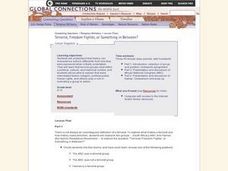Curated OER
Sizing Up the Supersize Croc
Students examine and compare traits of humans and crocodiles. In this crocodile lesson plan students use a ratio to estimate the height of a person and compare that to a crocodile.
Curated OER
Why do People Migrate?
Second graders examine the reasons for human migration. In this human migration lesson, 2nd graders make lists of reasons why people migrate. Students view pictures of people who have migrated and discuss why. Then the students watch a...
Curated OER
Whose Rights are Right?
Students consider the concept of 'human rights' in relation to the current conditions and history of East Timor and discuss the terms "human rights" and "force," applying their responses to specific historical examples.
Alabama Learning Exchange
Systems Every "Body" Needs to Know
Through an informative WebQuest and group work, learners explore the human body and cell structure. They create a cell diagram, research a disease, write a letter explaining the causes of human disease, and work in small groups to create...
Curated OER
Discrimination
Young scholars investigate what discrimination is and study Article 2 from the Universal Declaration of Human Rights. They participate in a role play activity involving majority and minority groups for which a letter was sent home to...
Curated OER
The Magic School Bus Flexes Its Muscles
Students learn along with Ms. Frizzle's class. In this Magic School Bus lesson plan, students explore the inside of the human body as they compare the bones and joints of a chicken wing with their own hands and arms.
Common Sense Press
What is the Skeletal System?
Students investigate the human skeletal system. In this biology lesson, students trace the outline of their body onto butcher paper and fill in the names of the bones. Students use an overhead transparency of the human skeletal system to...
Curated OER
Should US Officials & Health Professionals be Investigated for War Crimes?
Young scholars explore ethical issues. In this human rights lesson, students read articles and documents related to torture used in government investigations and if medical ethical guidelines were adhered to. Young scholars respond to...
Curated OER
The Gulf of Maine
Students examine the effect of limiting factors, especially when it comes to human beings. They examine data from the Gulf of Maine area.
Curated OER
America's Underwater Treasures Viewing Guide
Young scholars complete a worksheet while watching a video about how humans affect the ocean environment. They discover the need for a practice of balancing fisheries and their fishing practices. They examine how scientists use data to...
Curated OER
Image Classification
Students explore what are "multi-spectral" or "multi-band" images? They investigate how landscapes change over time- at least over the time-span of satellite imagery, particulary due to human influences. Students explore how to train...
Curated OER
Skeletons
In this science worksheet, students investigate the human skeletal system. Students read factual paragraphs with details about the bones in the human body and in some other species as well. Students complete a crossword puzzle.
Curated OER
Primate Evolution
In this primate evolution instructional activity, students will compare 3 characteristics that all primates share. Then students will compare the traits of current primates to early man by completing 5 short answer questions.
Curated OER
Changes in the Atmosphere or Hydrosphere
In this atmosphere and hydrosphere worksheet, learners work on assigned topic which are either categorized as human activity or natural activity which impact the atmosphere and the hydrosphere. Students work in groups and answer...
Curated OER
Life Cycle: Diversity in a Balance
In this life cycle workbook, 3rd graders complete several different activities in which they analyze different invertebrates, identify arthropods, examine human biology and plants, and study natural environments. 20 different activities...
Curated OER
Managing Wildlife
Students explore the relationship between wildlife and humans in northern New England. They also brainstorm ideas on why they think some species are greater in population than others in a given area.
Curated OER
Learning the Structure and Function of DNA
Students read about Humane Genome Project, examine structure and function of DNA, and participate in gel-electrophoresis lab. They complete Internet activity to test their knowledge of DNA.
Curated OER
Terrorist, Freedom Fighter, or Something in Between?
Students identify that history can characterize actions differently from how they were perceived when initially undertaken. Then they identify that terrorist groups exist within a political, cultural, and historical context, and students...
Curated OER
Topic: Persuasive Speech
Students examine what makes a speech persuasive. In this speech lesson, students recognizes what is needed to make a good persuasive speech and create their own persuasive speech about something related to the human body.
Curated OER
Trails of Understanding: The Earliest Immigrants
Students research Native American tribes. In this human migration lesson, students determine how tribes lived and established cultures. Students create PowerPoint presentations that feature their findings.
Curated OER
Body Organization and Structure
In this human body organization and structure worksheet, students complete 21 fill in the blank questions in the format of word scrambles, riddles, and puzzles.
Curated OER
Just-Us and Kindness: On Our Terms
Students consider their citizenship responsibilities in the world. In this philanthropy lesson, students define civic virtues as they consider how to be fair, just, and tolerant to promote human rights. Students complete a graphic...
Curated OER
Stanley Park and Aquarium Field Trip
Students explore the beauty of British Columbia by participating in a class field trip. In this ecosystem observation lesson, students investigate the Vancouver Aquarium and Stanley Park, one of the largest parks in North America....
Curated OER
Lesson: Living With the Farm Next Door
Discuss with learners why farms are growing in size and why there is sometimes conflict between farmers and their non-farming neighbors. Read the article, "Living With the Farm Next Door," and then craft letters to the editor from the...
Other popular searches
- Arts and Humanities
- Humanities and Music
- Humanities and Culture
- Art and Humanities
- Integrated Humanities
- What Are the Humanities
- Humanities Ancient Greece
- Humanities Africa
- Arts Humanities
- Arts; Humanities
- Primary Humanities
- Humanities Morality Plays























